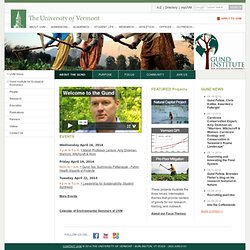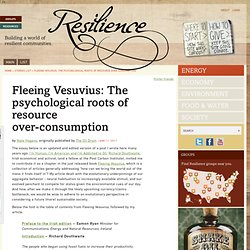

Umbrella View of Resource Depletion & Human Behaviour. Www.peakoil.nl/wp-content/uploads/2009/07/20090627_TODASPOSummit_Hagens_UmbrellaoverviewResourceDepletionHumanBehaviour2.pdf. Gund Institute for Ecological Economics. Marsh Professor Lecture: Amy Dickman, Warriors, Witchcraft & Women: Carnivore Ecology and Conservation in Tanzania’s Ruaha Landscape Wednesday, April 16 at 3 p.m. in Memorial Lounge, Waterman Building UVM is hosting Amy Dickman, Kaplan Senior Research Fellow in Felid Conservation at Pembroke College, University of Oxford.

She will give a free, public lecture on “Warriors, Witchcraft & Women: Carnivore Ecology and Conservation in Tanzania’s Ruaha Landscape,” Wednesday, April 16 at 3 p.m. in Memorial Lounge, Waterman Building. Nate Hagens - Navigating through a Room full of Elephants. Nate Hagens: The End of Growth. Dramatic socio-economic paradigm shift ahead. Introduction The current period can be undoubtedly characterized as an economical, ecological, cultural, political, but also moral crisis.

The solution seems to be as far off as ever and problems seem to be getting worse by the day everywhere. Why is that, what can we expect in the future and what are the safe outcomes from this future bottleneck? We have been talking to Nathan Hagens at the latest ASPO conference in Vienna, who holds a PhD degree in Natural Resources at the University of Vermont, MBA degree with honors from the University of Chicago in the field of finances. Nathan Hagens is the author of Trading Algorithms for Commodity Systems and was a Vice President of Salomon Brothers and Lehman Brothers. Currently he serves on the Board of Directors of the Institute For Integrated Economic Research in Switzerland and the Post Carbon Institute in the United States. Nate's presentation at the Conference can be found here Interview highlights: Nathan Hagens: Actually you can.
Oil Education TV » Nate Hagens. Fleeing Vesuvius: The psychological roots of resource over-consumption. The essay below is an updated and edited version of a post I wrote here many years ago, I'm Human, I'm American and I'm Addicted to Oil.

Richard Douthwaite, Irish economist and activist, (and a fellow at the Post Carbon Institute), invited me to contribute it as a chapter in the just released book Fleeing Vesuvius, which is a collection of articles generally addressing "how can we bring the world out of the mess it finds itself in"? My article dealt with the evolutionary underpinnings of our aggregate behavior - neural habituation to increasingly available stimuli, and our evolved penchant to compete for status given the environmental cues of our day. And how, after we make it through the likely upcoming currency/claims bottleneck, we would be wise to adhere to an evolutionary perspective in considering a future (more) sustainable society. Below the fold is the table of contents from Fleeing Vesuvius, followed by my article.
Here is my updated chapter from Fleeing Vesuvius Status Novelty. Nate Hagens: A Framework for Supply and Demand on a Full Planet. NATE HAGEN: What We Can Learn From Hedge Fund Investors. NATE HAGENS: What We Can Learn From Hedge Fund Investors length: 3:26 credit: Post Carbon Institute board member Nate Hagens discusses conspicuous consumption as a natural behavior--one that can be changed, one that must be changed quickly if we are to create stable, resilient societies.

"Without behavioral change, without changing the carrot that the United States and the countries that follow us compete for, away from conspicuous consumption... its only going to be fingers in the dyke, temporary fixes. " Nate is a well know authority on the overall resource depletion picture. He was, until recently, the editor of The Oil Drum, one of the most popular and highly-respected websites in the world for analysis and discussion of global energy supplies and their implications for the future.
Part 1: Nate Hagens "Energy, Resources, and Human Demand on a Full Planet"